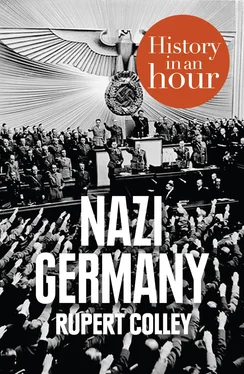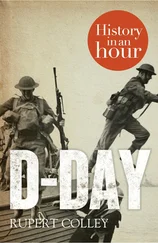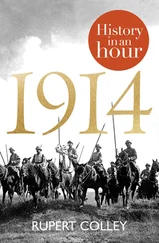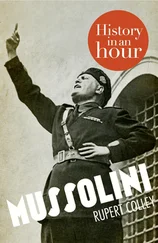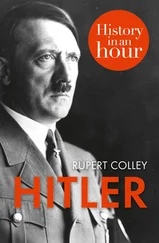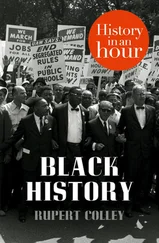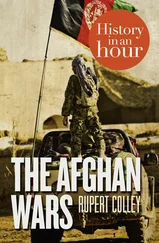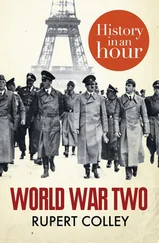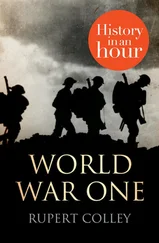Such was Hitler’s hatred of the Weimar government he decided to overthrow it. On the evening of 8 November 1923, he led a group of 600 Storm Troopers and together they burst into a Munich beer hall meeting. The 34-year-old Hitler fired two shots from his revolver into the ceiling, declaring that he was the new leader of the German government and that the ‘national revolution has begun.’
The Munich Putsch, 9 November 1923
Bundesarchiv, Bild 146-2007-0003 / Unknown / CC-BY-SA
Meanwhile, Röhm had seized the city’s war ministry. Hitler had expected the support of the army and the Bavarian police and then to march on to Berlin. But the support never materialized and the following day, as Hitler led 300 Nazis through the streets of Munich to meet Röhm, the police blocked their way. The Nazis refused to stop and the police opened fired, killing sixteen and wounding many more. Hitler hurled himself to the ground, dislocating his shoulder, then tried to make a run for it, but was caught and arrested. It was later claimed he was trying to get a wounded child to a hospital. The Munich Putsch may have failed but Hitler learnt a useful lesson – that power could not be secured through force but would have to be earned through legitimate means and the ballot box.
Mein Kampf: ‘Lies, Stupidity and Cowardice.’ Mein Kampf: ‘Lies, Stupidity and Cowardice.’ The Ruhr: An Economic Downturn The Great Depression: The Crash Nazi Elections: ‘He can lick stamps with my head on them.’ Enabling Act: ‘Fanatics, hooligans and eccentrics have got the upper hand.’ The First Anti-Jew Laws: ‘Non-citizens’. Night of the Long Knives: ‘The Führer’s soldierly decision and exemplary courage.’ The Führer: 99 per cent approval Nazi Germany and the Economy: ‘Guns will make us strong; butter will make us fat.’ State Control: Guilty Before Innocent The Family: ‘I detest women who dabble in politics.’ Propaganda: ‘Where they burn books, they will also ultimately burn people.’ The Olympics Kristallnacht: The Night of Broken Glass Foreign Policy: ‘Germany will of its own accord never break the peace.’ The Rhineland: ‘We have no territorial claims to make in Europe.’ The Spanish Civil War: ‘Germany’s destiny for good or bad.’ Anschluss: ‘I can strongly recommend the Gestapo to one and all.’ The Sudetenland: ‘The last major problem to be solved.’ Czechoslovakia: ‘That senile old rascal.’ Poland – Guaranteed Germany’s War 1939: ‘This country is at war with Germany.’ Germany’s War: 1940 to 1941 Germany’s War: 1942 to 1945 Appendix 1: Key Players Appendix 2: Timeline of Nazi Germany Copyright Got Another Hour? About the Publisher
Hitler was tried for high treason and could have faced the death penalty but got away with a lenient sentence of five years. He served less than nine months. Although frequently depressed and talking of suicide, Hitler used his time in prison constructively, dictating to Hess his autobiographical, ideological rant, Mein Kampf. Published in two volumes, the first on 18 July 1925, the second in 1926, it was originally entitled My 4½ Year Struggle Against Lies, Stupidity and Cowardice ; the new title being suggested by his publisher.
Much of it is devoted to race; the need for a pure race of German Aryans, untainted by the blood of different races. The Aryan race was of the highest order, the ‘bearers of culture’; the Jewish race (Hitler defined Jews by race not religion) of the lowest. The aim was to eliminate the Jews (referred to throughout the book by various unpleasant metaphors: parasites, germs, vermin) from society. He expanded on many of the themes of the Nazi manifesto, including Lebensraum , the union of all German-speaking people and the treachery of the Treaty of Versailles. Mein Kampf sold poorly at first and a second book, written in 1928, was never published. However, by 1939, with Hitler firmly in power, it outsold all other titles in Germany with the exception of the Bible.
The Ruhr: An Economic Downturn The Ruhr: An Economic Downturn The Great Depression: The Crash Nazi Elections: ‘He can lick stamps with my head on them.’ Enabling Act: ‘Fanatics, hooligans and eccentrics have got the upper hand.’ The First Anti-Jew Laws: ‘Non-citizens’. Night of the Long Knives: ‘The Führer’s soldierly decision and exemplary courage.’ The Führer: 99 per cent approval Nazi Germany and the Economy: ‘Guns will make us strong; butter will make us fat.’ State Control: Guilty Before Innocent The Family: ‘I detest women who dabble in politics.’ Propaganda: ‘Where they burn books, they will also ultimately burn people.’ The Olympics Kristallnacht: The Night of Broken Glass Foreign Policy: ‘Germany will of its own accord never break the peace.’ The Rhineland: ‘We have no territorial claims to make in Europe.’ The Spanish Civil War: ‘Germany’s destiny for good or bad.’ Anschluss: ‘I can strongly recommend the Gestapo to one and all.’ The Sudetenland: ‘The last major problem to be solved.’ Czechoslovakia: ‘That senile old rascal.’ Poland – Guaranteed Germany’s War 1939: ‘This country is at war with Germany.’ Germany’s War: 1940 to 1941 Germany’s War: 1942 to 1945 Appendix 1: Key Players Appendix 2: Timeline of Nazi Germany Copyright Got Another Hour? About the Publisher
The Weimar government was struggling to pay the reparations demanded by the Treaty of Versailles. The views of the Allied powers differed: the US had taken the isolationist route and paid little interest to what was happening in Europe; while Italy was in the midst of a fascist takeover. Britain felt that Versailles had been too harsh and sought reconciliation with the Germans, and advocated a reduction in reparations to aid the recovery of the Germany economy, which, in turn, would benefit the economy of Europe as a whole. Only the French were determined that Germany should fully meet her obligations.
In 1923 the Ruhr industrialists had stopped supplying France the requisite quota of German coal. The French and Belgium governments, angered by this breaking of the rules, sent troops into the region (pictured below). When the German workers of the Ruhr, affronted by this occupation, refused to work for the French, the French government sent in its own workforce. The occupation of the Ruhr caused chaos for Germany’s economy, triggering a period of high unemployment and hyperinflation. The inflation wiped lifetime savings out overnight: in 1921 the mark was worth one dollar. Two years later it was an unimaginable 4,000,000,000,000 to the dollar.
French soldiers during the occupation of the Ruhr, 1924
Bundesarchiv, Bild 102-00654 / CC-BY-SA
America began to realize, as had the British, that an economically unstable Germany would be detrimental to all Europe and tasked Charles Dawes, an American banker, to formulate a recovery programme. The Dawes Plan had the desired effect and from 1924 Germany enjoyed a period of relative prosperity. American loans and investment brought inflation down to a manageable level and unemployment fell. With American money, Germany began paying the French, Belgian and British reparations, albeit at a lesser rate, and the Allied nations, in turn, were able to start repaying their war debts to the US. It was an unending circular movement of money. By 1925 the French and Belgians had withdrawn from the Ruhr.
On the international stage too, relations between Germany and its European neighbours became less tense, ending Germany’s sense of isolation, and leading, in 1926, to Germany joining the League of Nations. In 1929, based on the recommendation of the American commissioned Young Plan (after its author Owen D. Young), reparations were cut by 75 per cent. Following the Great Depression payments were suspended for a year and by 1931 reparations were dropped altogether. Germany had paid back only an eighth of the original demand.
Читать дальше
